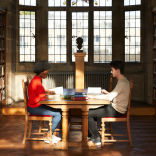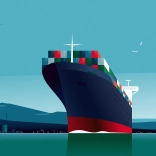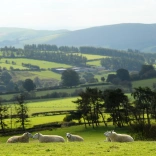And where can you stand on a kilometre-high peak with views of four different nations, kayak through Atlantic surf with only inquisitive seals for company, and savour a Michelin-starred feast of a dinner before walking home under a clear, starry sky – all in the same day?
Croeso i Gymru. Welcome to Wales.
Welcome to Wales, a country on the western edge of Britain. We have a long history, a beautiful landscape, and a very cool flag. You know, the one with the red dragon on it. We’re pretty friendly people, too, and we love to give a warm welcome. (And our welcome is legendary - whenever Wales features in travel-writers’ round-ups of the hottest destinations our hospitality is praised as much as our beautiful landscape.) For those who stay longer, there’s the chance to enjoy an enviable work-life balance, in a strong community with inexhaustible options to fill up leisure time.
Although Wales is part of the United Kingdom, we’re different and distinct from our friends in England, Scotland and Northern Ireland. We speak a poetic language that’s different from English, and a lot older. It’s called Cymraeg (or Welsh) and has a lyrical beauty that expresses the true soul of Wales. We’ll be using a bit of Cymraeg on this site, but we’ll translate everything into English so you can start to appreciate the poetic joy of the Welsh language.
Wales is a proud nation. We’re both part of the United Kingdom and a country in our own right, with a devolved government and a Welsh Parliament that passes our own laws. Around 3.1 million people live here, in a land of amazing geographical diversity. Around a quarter of Wales, from the mountains to the sea, is designated a National Park or an Area of Outstanding Natural Beauty.
Doing good things has never been more important. So we’re doing good things – for each other, for our country, for the world. People around the world are craving better, more sustainable ways of living, working, travelling, learning and doing business.
St David, the patron saint of Wales, believed in doing the little things that make a big difference. This phrase that has never been more relevant, and has especially taken on significant meaning to audiences across the globe during the coronavirus pandemic, with many people doing good things to help others, and finding joy and happiness in life’s simple pleasures.
Addo is a Welsh word that means to promise. To pledge. Our industry, our communities and regions are preparing to make sure Wales is a safe place. We are asking people to invest emotionally in Wales and to show that they care too and that we’ll all be playing our part in caring for ourselves and others.
Doing little things that matter will make a big difference to welcoming you back to Wales when it is safe to do so.
If you are considering international group travel again you can visit our Travel Trade and Business Events websites for more information and support, and as your clients prepare to explore Wales, we're encouraging you to share the promise with them, to care for each other and this special place we call home.

Creativity is at the heart of Welsh life. Writers and musicians are the first people to get a name-check in the lyrics of our national anthem. In turn, they’ve carried the name of Wales far and wide. We might mention Dylan Thomas, Roald Dahl and Jan Morris – or Shirley Bassey, Bryn Terfel, Rebecca Evans and the Manic Street Preachers.
The artistic roster doesn’t end there. We’ve given the world Laura Ashley’s floral prints, Russell T Davies’ reboot of Doctor Who, the landscape paintings of Kyffin Williams and the screen performances of Anthony Hopkins, Luke Evans, Michael Sheen and Catherine Zeta-Jones.



Wales means business – and creativity has its part to play there, too. We have always been a nation where innovation and enterprise go hand in hand, and ideas don’t stay on the drawing board for long. Welsh inventions include ball bearings, the microphone, deep-space photography and the hydrogen fuel cell – not to mention the “packet switching” concept that made the internet possible, and even the equals sign in mathematics. Today, we have world-class universities and a skilled workforce: 30 per cent of the population are graduates.
Being able to tap into this talent pool is one reason why businesses come to Wales to grow and realise their potential. Easy access to decision-makers is another. And sustainability is at the top of the business agenda. We were the first nation of the UK to introduce a charge for single-use carrier bags. Our economic policies promote and reward good environmental practice, and we have ambitious targets for reducing waste and shrinking industry’s carbon footprint.

The Welsh language is part of everyday life. It’s spoken by more than half a million people, taught in schools and celebrated at festivals such as the eisteddfodau that are the highlight of Wales’ cultural calendar. You’ll see it in place names and on street signs, and hear it on television and radio channels. It has a thriving music scene, and Welsh-language films and TV programmes are making a mark far beyond our borders.
It’s a part of our living heritage – and in Wales, heritage is something that refuses to be contained in museums or between the covers of dusty books. Wherever you turn, you’ll find signposts to a rich and complex history, from the remains of Roman encampments to the dazzlingly grand country estates built by aristocrats and industrialists. Wales was the powerhouse of the Industrial Revolution, the cradle of the workers’ rights movement and the birthplace of the National Health Service. All are sources of fierce pride.



We’re well known for our castles, which number more than 600. Some, like Criccieth and Carreg Cennen, were built by native Welsh princes; others, such as Edward I’s mighty “iron ring” of Beaumaris, Harlech, Caernarfon and Conwy, were established by occupying forces. There are faux-castles, too, built for show rather than defence. Arguably the greatest is the Victorian Castell Coch, with its fairy-tale cone turrets.
Traditions and festivities tie the modern nation of Wales to its past. On the first of March, the country comes together to celebrate St David’s Day, with children dressing in national costume or pulling on the red jersey of our sports teams. And by the time others are anxiously exchanging cards on Valentine’s Day, we’ve done all our wooing in Wales. Our patron saint of lovers, St Dwynwen, has her special day almost three weeks earlier on 25 January.

What’s more, popular culture is a shared experience in Wales. It’s something you’ll witness in the sense of anticipation for the headlining act at the Green Man Festival, or in the pre-match build-up for a Six Nations rugby game at Cardiff’s Principality Stadium. It’s a sentiment neatly summed up in the slogan of our football team, when the boot of Gareth Bale helped them storm into the Euro 2016 semi-finals: Together Stronger.
And at the risk of blowing our own trumpet, we’ve been going through rather a golden patch of sporting success. Dare we mention Jade Jones’ Olympic taekwondo golds, Geraint Thomas’ Tour de France victory and Sam Warburton’s captaincy of the British Lions?

Whether you’re living here or just visiting, Wales gets under your skin. It’s why going away evokes a wistful sense of yearning (and there’s a Welsh word for that: hiraeth). We’re a modern nation with an ancient heart, and this is our identity.
We love our country and we’re very proud of it, but we’re also proud to be citizens of the world. Welsh expats have travelled to — and settled in — just about every country around the globe. Our capital, Cardiff, was the UK’s first multicultural community. We feel very much part of the wider world community, too, and we’re determined to be good global citizens. After all, we all share the same planet, and we face the same challenges.
Forward-thinking countries like ours have big ideas that can make a real difference.
So welcome to Wales.
Or as we say here, Croeso i Gymru.




